Contract Law Case Study: Brisbane City Council v Group Project Pty Ltd
VerifiedAdded on 2019/12/28
|9
|2551
|173
Case Study
AI Summary
This case study analyzes the legal dispute in Brisbane City Council v Group Project Pty Ltd, focusing on contract law principles. The case involves a contract between the Brisbane City Council and Group Project Pty Ltd regarding land development. The analysis covers the formation of the contract, the obligations of both parties, and the impact of the Crown taking the land for a school, leading to the claim of contract frustration. The study explores key legal concepts such as offer, acceptance, consideration, and implied terms, referencing relevant cases like Slade v Morley and Harvey v Facey. It examines the implications of breach of contract and the court's decision to dismiss the appeal, concluding that the contract was frustrated from the beginning due to the change in circumstances. The assignment references various legal texts and journals to support its analysis.
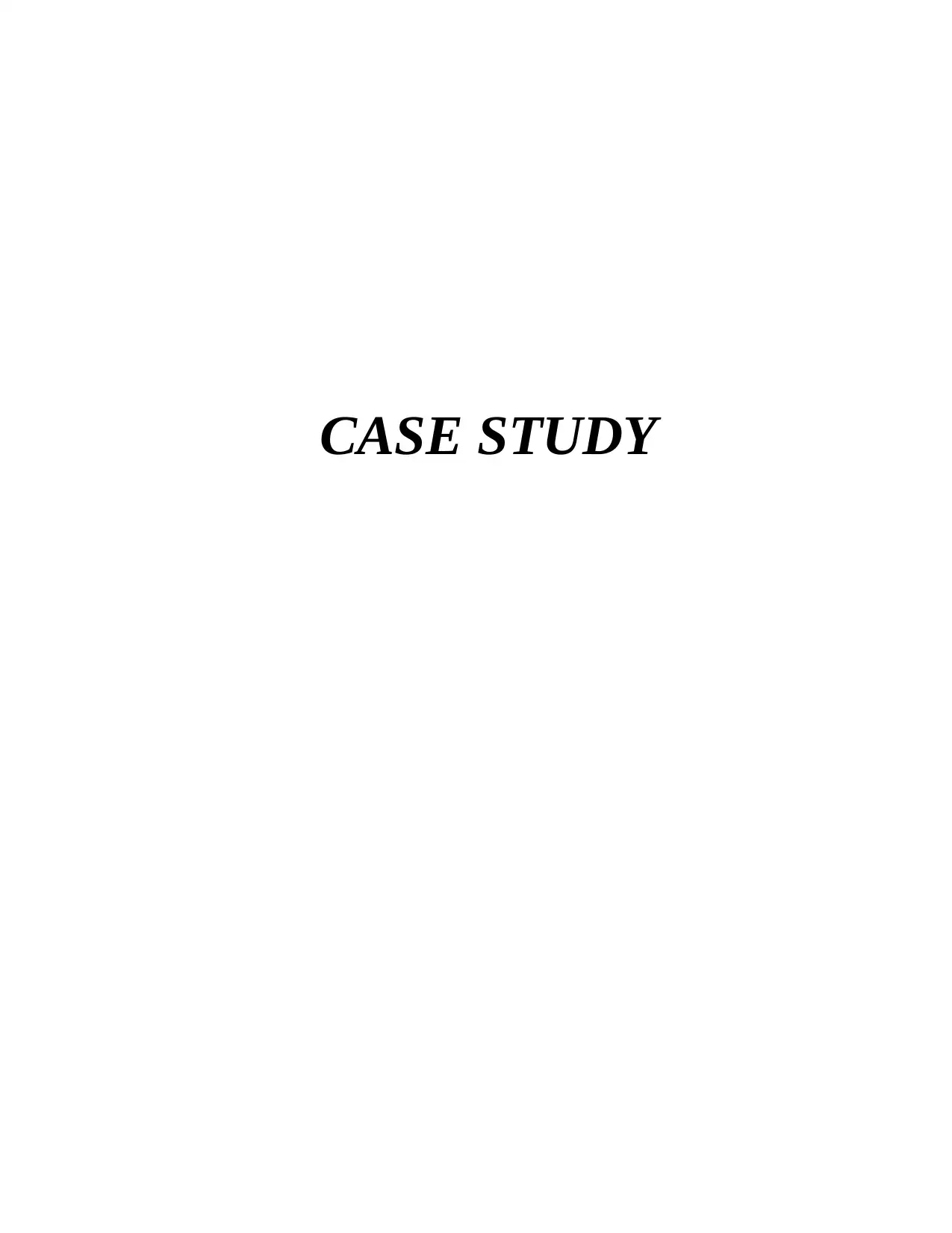
CASE STUDY
Paraphrase This Document
Need a fresh take? Get an instant paraphrase of this document with our AI Paraphraser

Table of Contents
INTRODUCTION....................................................................................................................................................3
TASK........................................................................................................................................................................3
CONCLUSION........................................................................................................................................................7
REFERENCES ........................................................................................................................................................8
INTRODUCTION....................................................................................................................................................3
TASK........................................................................................................................................................................3
CONCLUSION........................................................................................................................................................7
REFERENCES ........................................................................................................................................................8
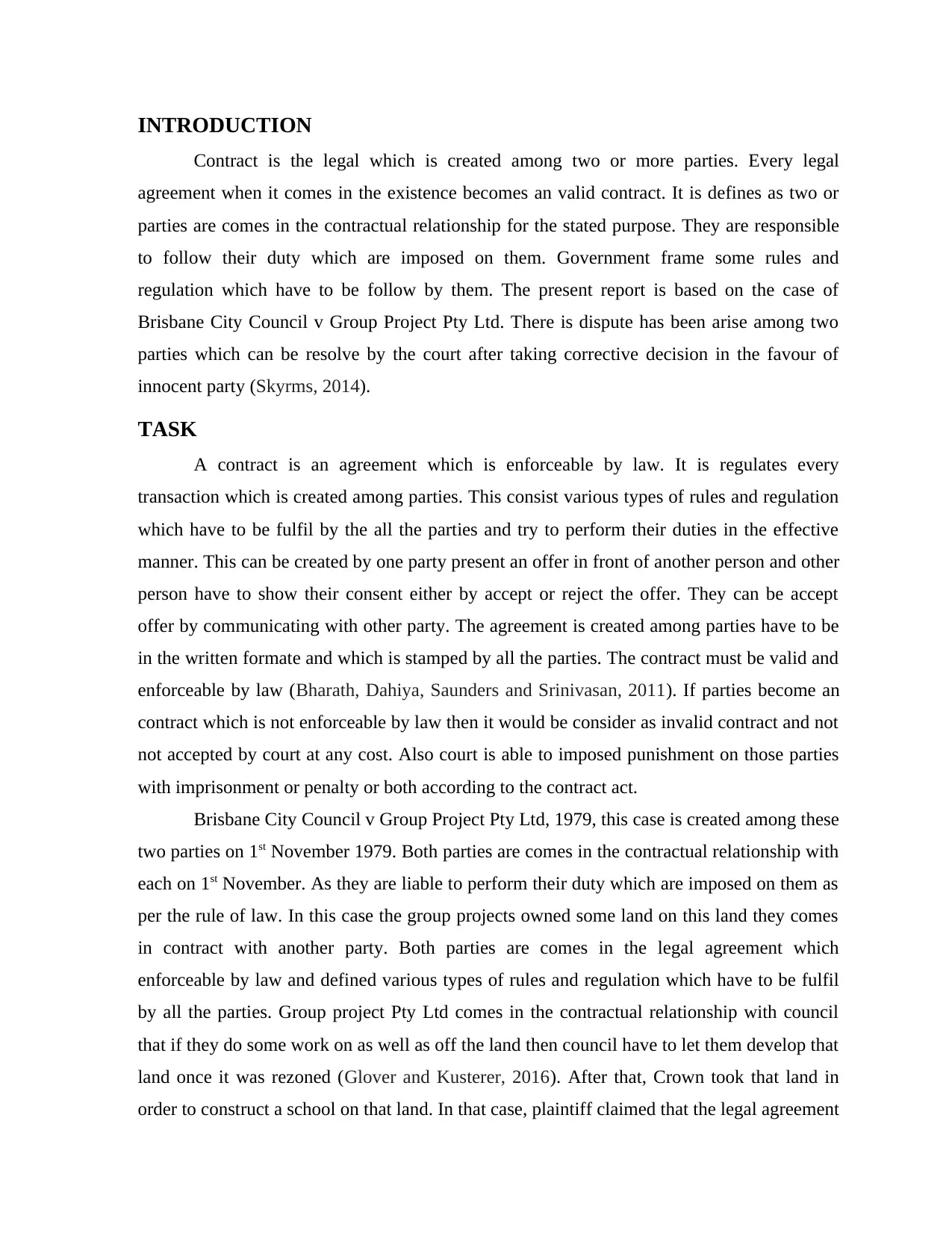
INTRODUCTION
Contract is the legal which is created among two or more parties. Every legal
agreement when it comes in the existence becomes an valid contract. It is defines as two or
parties are comes in the contractual relationship for the stated purpose. They are responsible
to follow their duty which are imposed on them. Government frame some rules and
regulation which have to be follow by them. The present report is based on the case of
Brisbane City Council v Group Project Pty Ltd. There is dispute has been arise among two
parties which can be resolve by the court after taking corrective decision in the favour of
innocent party (Skyrms, 2014).
TASK
A contract is an agreement which is enforceable by law. It is regulates every
transaction which is created among parties. This consist various types of rules and regulation
which have to be fulfil by the all the parties and try to perform their duties in the effective
manner. This can be created by one party present an offer in front of another person and other
person have to show their consent either by accept or reject the offer. They can be accept
offer by communicating with other party. The agreement is created among parties have to be
in the written formate and which is stamped by all the parties. The contract must be valid and
enforceable by law (Bharath, Dahiya, Saunders and Srinivasan, 2011). If parties become an
contract which is not enforceable by law then it would be consider as invalid contract and not
not accepted by court at any cost. Also court is able to imposed punishment on those parties
with imprisonment or penalty or both according to the contract act.
Brisbane City Council v Group Project Pty Ltd, 1979, this case is created among these
two parties on 1st November 1979. Both parties are comes in the contractual relationship with
each on 1st November. As they are liable to perform their duty which are imposed on them as
per the rule of law. In this case the group projects owned some land on this land they comes
in contract with another party. Both parties are comes in the legal agreement which
enforceable by law and defined various types of rules and regulation which have to be fulfil
by all the parties. Group project Pty Ltd comes in the contractual relationship with council
that if they do some work on as well as off the land then council have to let them develop that
land once it was rezoned (Glover and Kusterer, 2016). After that, Crown took that land in
order to construct a school on that land. In that case, plaintiff claimed that the legal agreement
Contract is the legal which is created among two or more parties. Every legal
agreement when it comes in the existence becomes an valid contract. It is defines as two or
parties are comes in the contractual relationship for the stated purpose. They are responsible
to follow their duty which are imposed on them. Government frame some rules and
regulation which have to be follow by them. The present report is based on the case of
Brisbane City Council v Group Project Pty Ltd. There is dispute has been arise among two
parties which can be resolve by the court after taking corrective decision in the favour of
innocent party (Skyrms, 2014).
TASK
A contract is an agreement which is enforceable by law. It is regulates every
transaction which is created among parties. This consist various types of rules and regulation
which have to be fulfil by the all the parties and try to perform their duties in the effective
manner. This can be created by one party present an offer in front of another person and other
person have to show their consent either by accept or reject the offer. They can be accept
offer by communicating with other party. The agreement is created among parties have to be
in the written formate and which is stamped by all the parties. The contract must be valid and
enforceable by law (Bharath, Dahiya, Saunders and Srinivasan, 2011). If parties become an
contract which is not enforceable by law then it would be consider as invalid contract and not
not accepted by court at any cost. Also court is able to imposed punishment on those parties
with imprisonment or penalty or both according to the contract act.
Brisbane City Council v Group Project Pty Ltd, 1979, this case is created among these
two parties on 1st November 1979. Both parties are comes in the contractual relationship with
each on 1st November. As they are liable to perform their duty which are imposed on them as
per the rule of law. In this case the group projects owned some land on this land they comes
in contract with another party. Both parties are comes in the legal agreement which
enforceable by law and defined various types of rules and regulation which have to be fulfil
by all the parties. Group project Pty Ltd comes in the contractual relationship with council
that if they do some work on as well as off the land then council have to let them develop that
land once it was rezoned (Glover and Kusterer, 2016). After that, Crown took that land in
order to construct a school on that land. In that case, plaintiff claimed that the legal agreement
⊘ This is a preview!⊘
Do you want full access?
Subscribe today to unlock all pages.

Trusted by 1+ million students worldwide
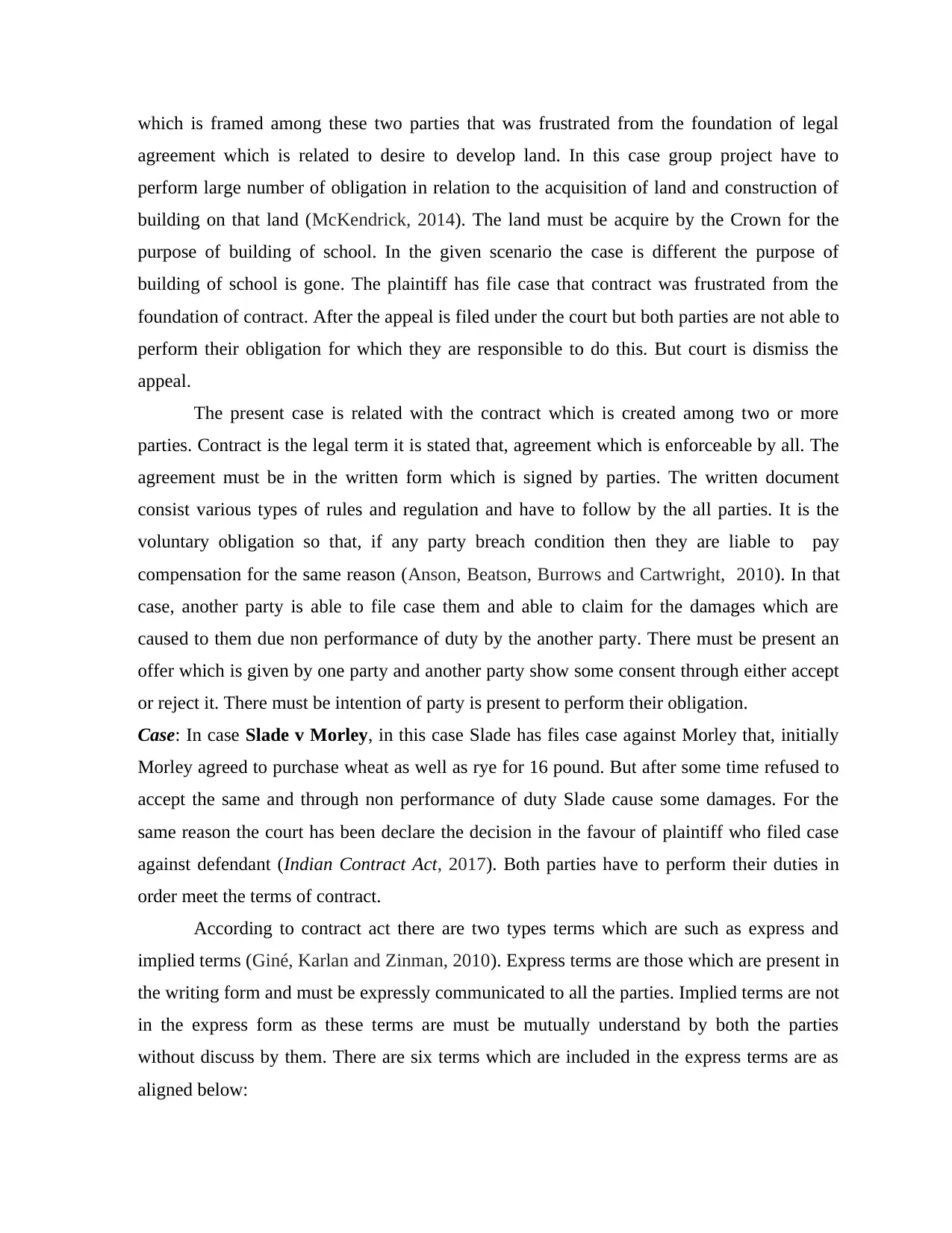
which is framed among these two parties that was frustrated from the foundation of legal
agreement which is related to desire to develop land. In this case group project have to
perform large number of obligation in relation to the acquisition of land and construction of
building on that land (McKendrick, 2014). The land must be acquire by the Crown for the
purpose of building of school. In the given scenario the case is different the purpose of
building of school is gone. The plaintiff has file case that contract was frustrated from the
foundation of contract. After the appeal is filed under the court but both parties are not able to
perform their obligation for which they are responsible to do this. But court is dismiss the
appeal.
The present case is related with the contract which is created among two or more
parties. Contract is the legal term it is stated that, agreement which is enforceable by all. The
agreement must be in the written form which is signed by parties. The written document
consist various types of rules and regulation and have to follow by the all parties. It is the
voluntary obligation so that, if any party breach condition then they are liable to pay
compensation for the same reason (Anson, Beatson, Burrows and Cartwright, 2010). In that
case, another party is able to file case them and able to claim for the damages which are
caused to them due non performance of duty by the another party. There must be present an
offer which is given by one party and another party show some consent through either accept
or reject it. There must be intention of party is present to perform their obligation.
Case: In case Slade v Morley, in this case Slade has files case against Morley that, initially
Morley agreed to purchase wheat as well as rye for 16 pound. But after some time refused to
accept the same and through non performance of duty Slade cause some damages. For the
same reason the court has been declare the decision in the favour of plaintiff who filed case
against defendant (Indian Contract Act, 2017). Both parties have to perform their duties in
order meet the terms of contract.
According to contract act there are two types terms which are such as express and
implied terms (Giné, Karlan and Zinman, 2010). Express terms are those which are present in
the writing form and must be expressly communicated to all the parties. Implied terms are not
in the express form as these terms are must be mutually understand by both the parties
without discuss by them. There are six terms which are included in the express terms are as
aligned below:
agreement which is related to desire to develop land. In this case group project have to
perform large number of obligation in relation to the acquisition of land and construction of
building on that land (McKendrick, 2014). The land must be acquire by the Crown for the
purpose of building of school. In the given scenario the case is different the purpose of
building of school is gone. The plaintiff has file case that contract was frustrated from the
foundation of contract. After the appeal is filed under the court but both parties are not able to
perform their obligation for which they are responsible to do this. But court is dismiss the
appeal.
The present case is related with the contract which is created among two or more
parties. Contract is the legal term it is stated that, agreement which is enforceable by all. The
agreement must be in the written form which is signed by parties. The written document
consist various types of rules and regulation and have to follow by the all parties. It is the
voluntary obligation so that, if any party breach condition then they are liable to pay
compensation for the same reason (Anson, Beatson, Burrows and Cartwright, 2010). In that
case, another party is able to file case them and able to claim for the damages which are
caused to them due non performance of duty by the another party. There must be present an
offer which is given by one party and another party show some consent through either accept
or reject it. There must be intention of party is present to perform their obligation.
Case: In case Slade v Morley, in this case Slade has files case against Morley that, initially
Morley agreed to purchase wheat as well as rye for 16 pound. But after some time refused to
accept the same and through non performance of duty Slade cause some damages. For the
same reason the court has been declare the decision in the favour of plaintiff who filed case
against defendant (Indian Contract Act, 2017). Both parties have to perform their duties in
order meet the terms of contract.
According to contract act there are two types terms which are such as express and
implied terms (Giné, Karlan and Zinman, 2010). Express terms are those which are present in
the writing form and must be expressly communicated to all the parties. Implied terms are not
in the express form as these terms are must be mutually understand by both the parties
without discuss by them. There are six terms which are included in the express terms are as
aligned below:
Paraphrase This Document
Need a fresh take? Get an instant paraphrase of this document with our AI Paraphraser
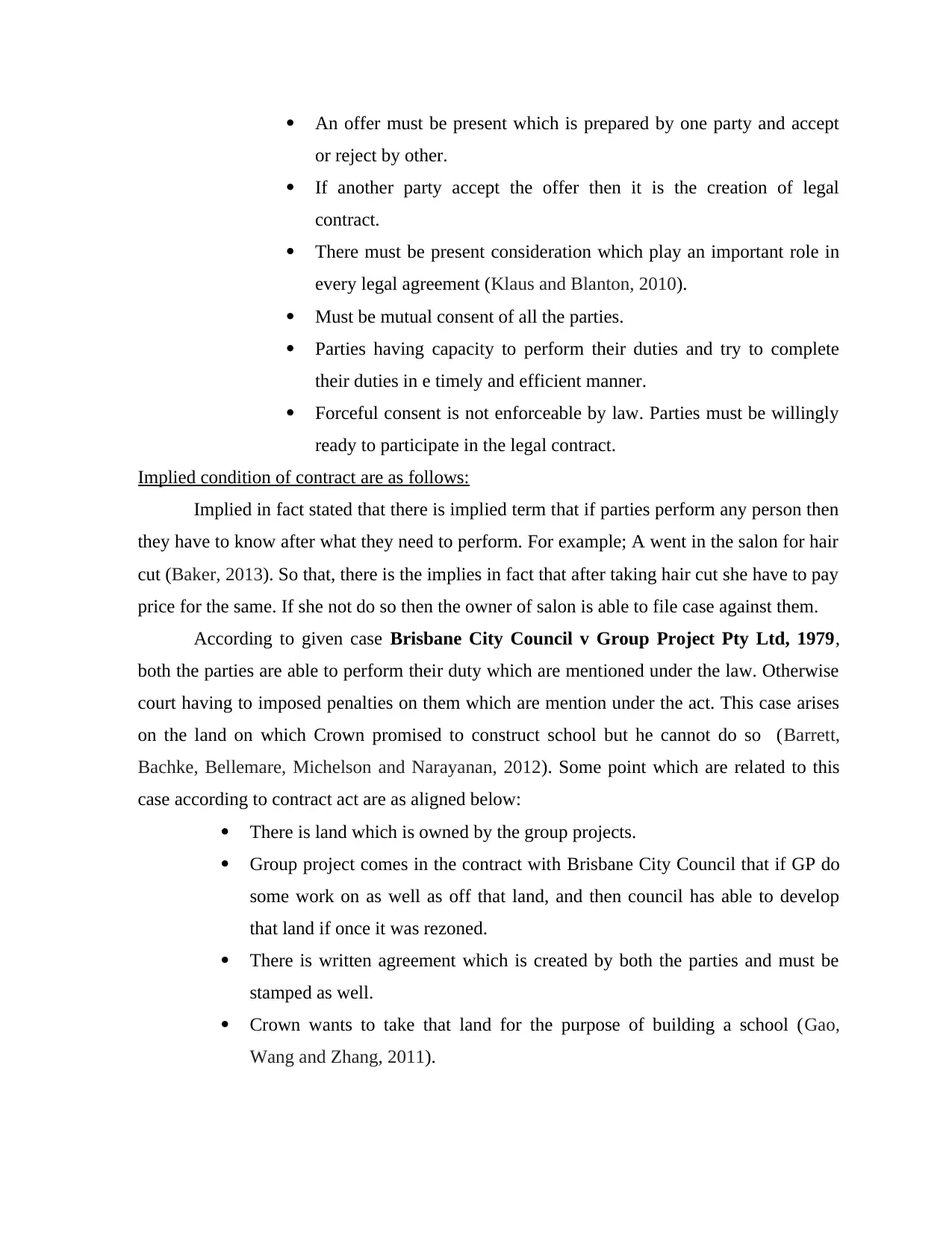
An offer must be present which is prepared by one party and accept
or reject by other.
If another party accept the offer then it is the creation of legal
contract.
There must be present consideration which play an important role in
every legal agreement (Klaus and Blanton, 2010).
Must be mutual consent of all the parties.
Parties having capacity to perform their duties and try to complete
their duties in e timely and efficient manner.
Forceful consent is not enforceable by law. Parties must be willingly
ready to participate in the legal contract.
Implied condition of contract are as follows:
Implied in fact stated that there is implied term that if parties perform any person then
they have to know after what they need to perform. For example; A went in the salon for hair
cut (Baker, 2013). So that, there is the implies in fact that after taking hair cut she have to pay
price for the same. If she not do so then the owner of salon is able to file case against them.
According to given case Brisbane City Council v Group Project Pty Ltd, 1979,
both the parties are able to perform their duty which are mentioned under the law. Otherwise
court having to imposed penalties on them which are mention under the act. This case arises
on the land on which Crown promised to construct school but he cannot do so (Barrett,
Bachke, Bellemare, Michelson and Narayanan, 2012). Some point which are related to this
case according to contract act are as aligned below:
There is land which is owned by the group projects.
Group project comes in the contract with Brisbane City Council that if GP do
some work on as well as off that land, and then council has able to develop
that land if once it was rezoned.
There is written agreement which is created by both the parties and must be
stamped as well.
Crown wants to take that land for the purpose of building a school (Gao,
Wang and Zhang, 2011).
or reject by other.
If another party accept the offer then it is the creation of legal
contract.
There must be present consideration which play an important role in
every legal agreement (Klaus and Blanton, 2010).
Must be mutual consent of all the parties.
Parties having capacity to perform their duties and try to complete
their duties in e timely and efficient manner.
Forceful consent is not enforceable by law. Parties must be willingly
ready to participate in the legal contract.
Implied condition of contract are as follows:
Implied in fact stated that there is implied term that if parties perform any person then
they have to know after what they need to perform. For example; A went in the salon for hair
cut (Baker, 2013). So that, there is the implies in fact that after taking hair cut she have to pay
price for the same. If she not do so then the owner of salon is able to file case against them.
According to given case Brisbane City Council v Group Project Pty Ltd, 1979,
both the parties are able to perform their duty which are mentioned under the law. Otherwise
court having to imposed penalties on them which are mention under the act. This case arises
on the land on which Crown promised to construct school but he cannot do so (Barrett,
Bachke, Bellemare, Michelson and Narayanan, 2012). Some point which are related to this
case according to contract act are as aligned below:
There is land which is owned by the group projects.
Group project comes in the contract with Brisbane City Council that if GP do
some work on as well as off that land, and then council has able to develop
that land if once it was rezoned.
There is written agreement which is created by both the parties and must be
stamped as well.
Crown wants to take that land for the purpose of building a school (Gao,
Wang and Zhang, 2011).
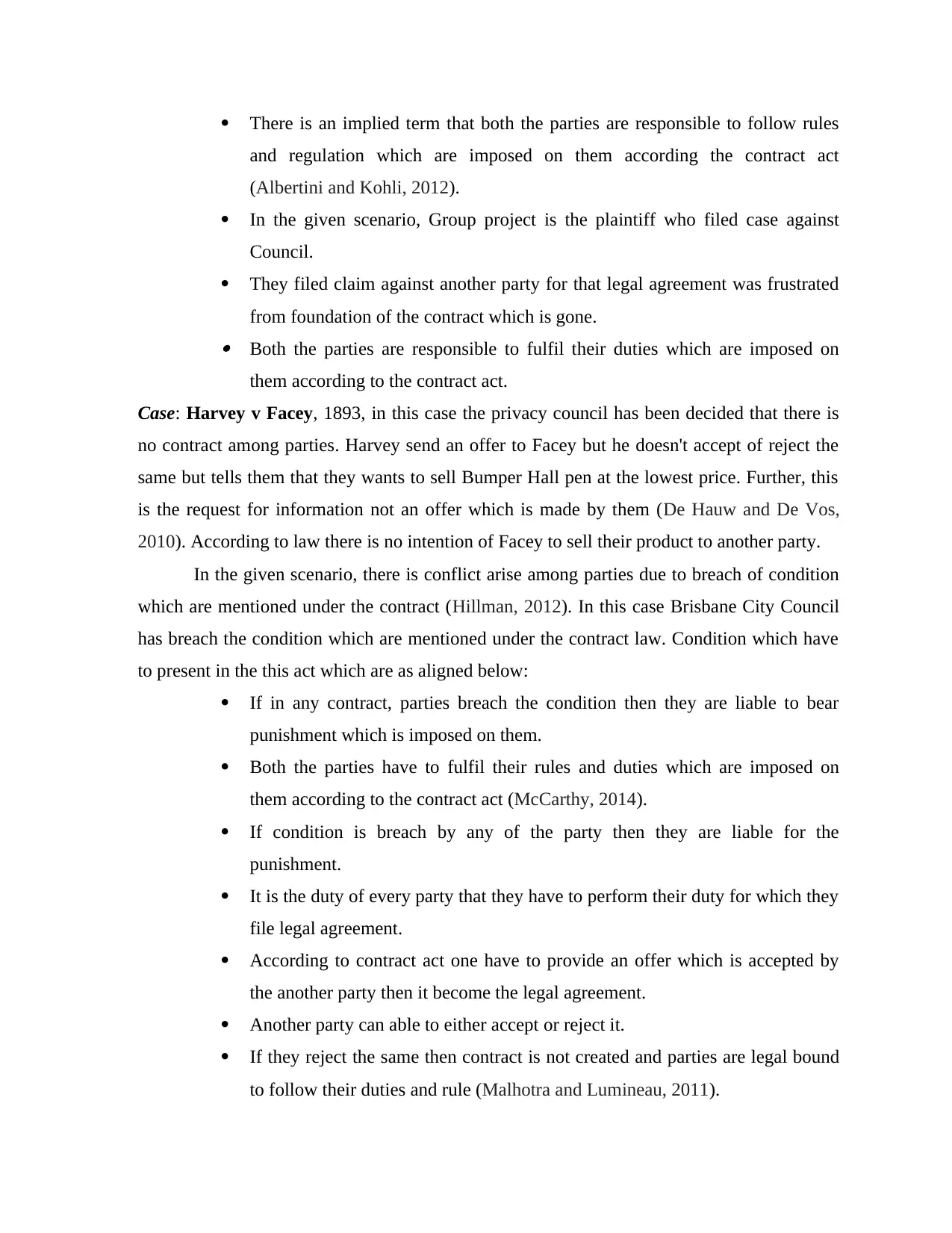
There is an implied term that both the parties are responsible to follow rules
and regulation which are imposed on them according the contract act
(Albertini and Kohli, 2012).
In the given scenario, Group project is the plaintiff who filed case against
Council.
They filed claim against another party for that legal agreement was frustrated
from foundation of the contract which is gone.
Both the parties are responsible to fulfil their duties which are imposed on
them according to the contract act.
Case: Harvey v Facey, 1893, in this case the privacy council has been decided that there is
no contract among parties. Harvey send an offer to Facey but he doesn't accept of reject the
same but tells them that they wants to sell Bumper Hall pen at the lowest price. Further, this
is the request for information not an offer which is made by them (De Hauw and De Vos,
2010). According to law there is no intention of Facey to sell their product to another party.
In the given scenario, there is conflict arise among parties due to breach of condition
which are mentioned under the contract (Hillman, 2012). In this case Brisbane City Council
has breach the condition which are mentioned under the contract law. Condition which have
to present in the this act which are as aligned below:
If in any contract, parties breach the condition then they are liable to bear
punishment which is imposed on them.
Both the parties have to fulfil their rules and duties which are imposed on
them according to the contract act (McCarthy, 2014).
If condition is breach by any of the party then they are liable for the
punishment.
It is the duty of every party that they have to perform their duty for which they
file legal agreement.
According to contract act one have to provide an offer which is accepted by
the another party then it become the legal agreement.
Another party can able to either accept or reject it.
If they reject the same then contract is not created and parties are legal bound
to follow their duties and rule (Malhotra and Lumineau, 2011).
and regulation which are imposed on them according the contract act
(Albertini and Kohli, 2012).
In the given scenario, Group project is the plaintiff who filed case against
Council.
They filed claim against another party for that legal agreement was frustrated
from foundation of the contract which is gone.
Both the parties are responsible to fulfil their duties which are imposed on
them according to the contract act.
Case: Harvey v Facey, 1893, in this case the privacy council has been decided that there is
no contract among parties. Harvey send an offer to Facey but he doesn't accept of reject the
same but tells them that they wants to sell Bumper Hall pen at the lowest price. Further, this
is the request for information not an offer which is made by them (De Hauw and De Vos,
2010). According to law there is no intention of Facey to sell their product to another party.
In the given scenario, there is conflict arise among parties due to breach of condition
which are mentioned under the contract (Hillman, 2012). In this case Brisbane City Council
has breach the condition which are mentioned under the contract law. Condition which have
to present in the this act which are as aligned below:
If in any contract, parties breach the condition then they are liable to bear
punishment which is imposed on them.
Both the parties have to fulfil their rules and duties which are imposed on
them according to the contract act (McCarthy, 2014).
If condition is breach by any of the party then they are liable for the
punishment.
It is the duty of every party that they have to perform their duty for which they
file legal agreement.
According to contract act one have to provide an offer which is accepted by
the another party then it become the legal agreement.
Another party can able to either accept or reject it.
If they reject the same then contract is not created and parties are legal bound
to follow their duties and rule (Malhotra and Lumineau, 2011).
⊘ This is a preview!⊘
Do you want full access?
Subscribe today to unlock all pages.

Trusted by 1+ million students worldwide
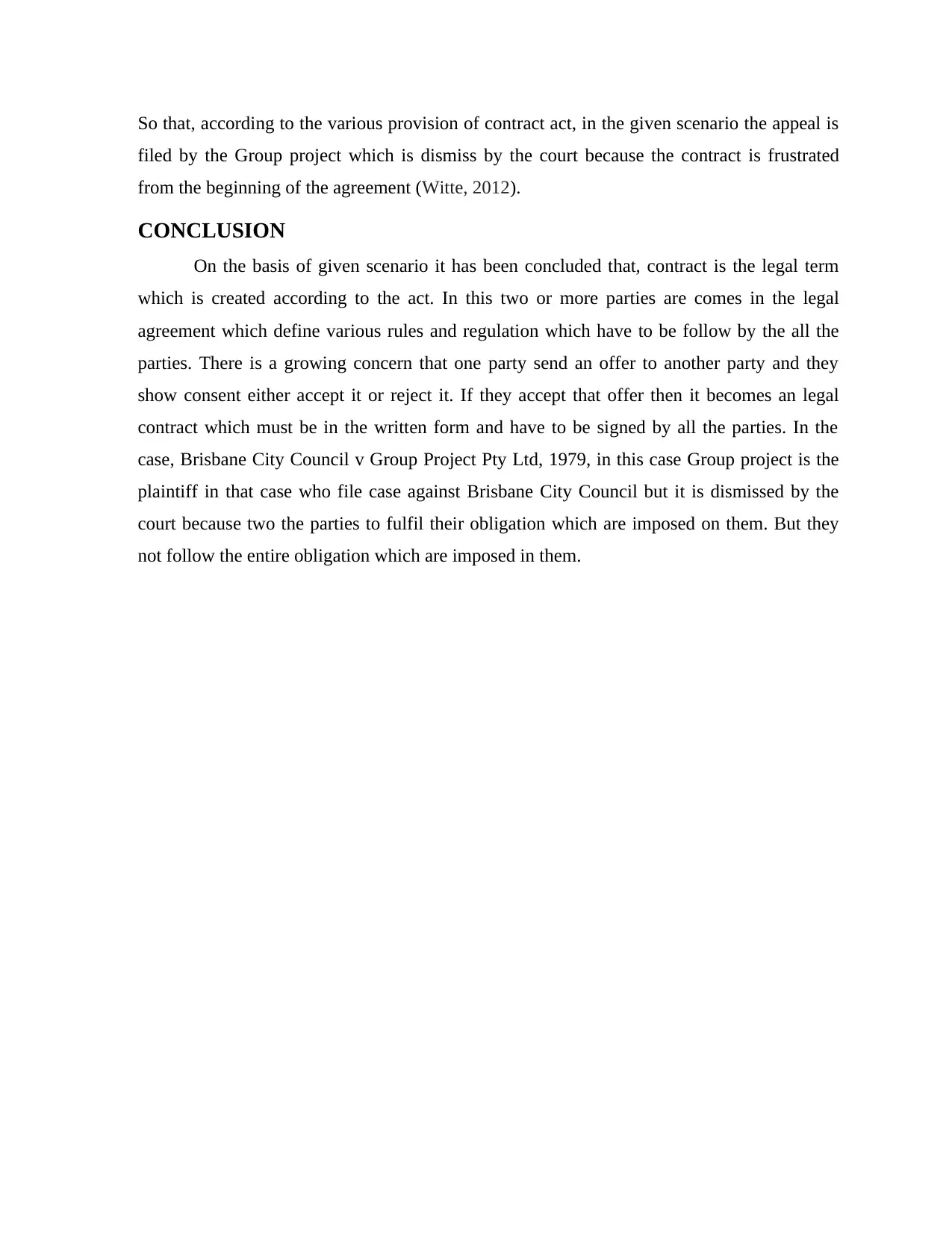
So that, according to the various provision of contract act, in the given scenario the appeal is
filed by the Group project which is dismiss by the court because the contract is frustrated
from the beginning of the agreement (Witte, 2012).
CONCLUSION
On the basis of given scenario it has been concluded that, contract is the legal term
which is created according to the act. In this two or more parties are comes in the legal
agreement which define various rules and regulation which have to be follow by the all the
parties. There is a growing concern that one party send an offer to another party and they
show consent either accept it or reject it. If they accept that offer then it becomes an legal
contract which must be in the written form and have to be signed by all the parties. In the
case, Brisbane City Council v Group Project Pty Ltd, 1979, in this case Group project is the
plaintiff in that case who file case against Brisbane City Council but it is dismissed by the
court because two the parties to fulfil their obligation which are imposed on them. But they
not follow the entire obligation which are imposed in them.
filed by the Group project which is dismiss by the court because the contract is frustrated
from the beginning of the agreement (Witte, 2012).
CONCLUSION
On the basis of given scenario it has been concluded that, contract is the legal term
which is created according to the act. In this two or more parties are comes in the legal
agreement which define various rules and regulation which have to be follow by the all the
parties. There is a growing concern that one party send an offer to another party and they
show consent either accept it or reject it. If they accept that offer then it becomes an legal
contract which must be in the written form and have to be signed by all the parties. In the
case, Brisbane City Council v Group Project Pty Ltd, 1979, in this case Group project is the
plaintiff in that case who file case against Brisbane City Council but it is dismissed by the
court because two the parties to fulfil their obligation which are imposed on them. But they
not follow the entire obligation which are imposed in them.
Paraphrase This Document
Need a fresh take? Get an instant paraphrase of this document with our AI Paraphraser
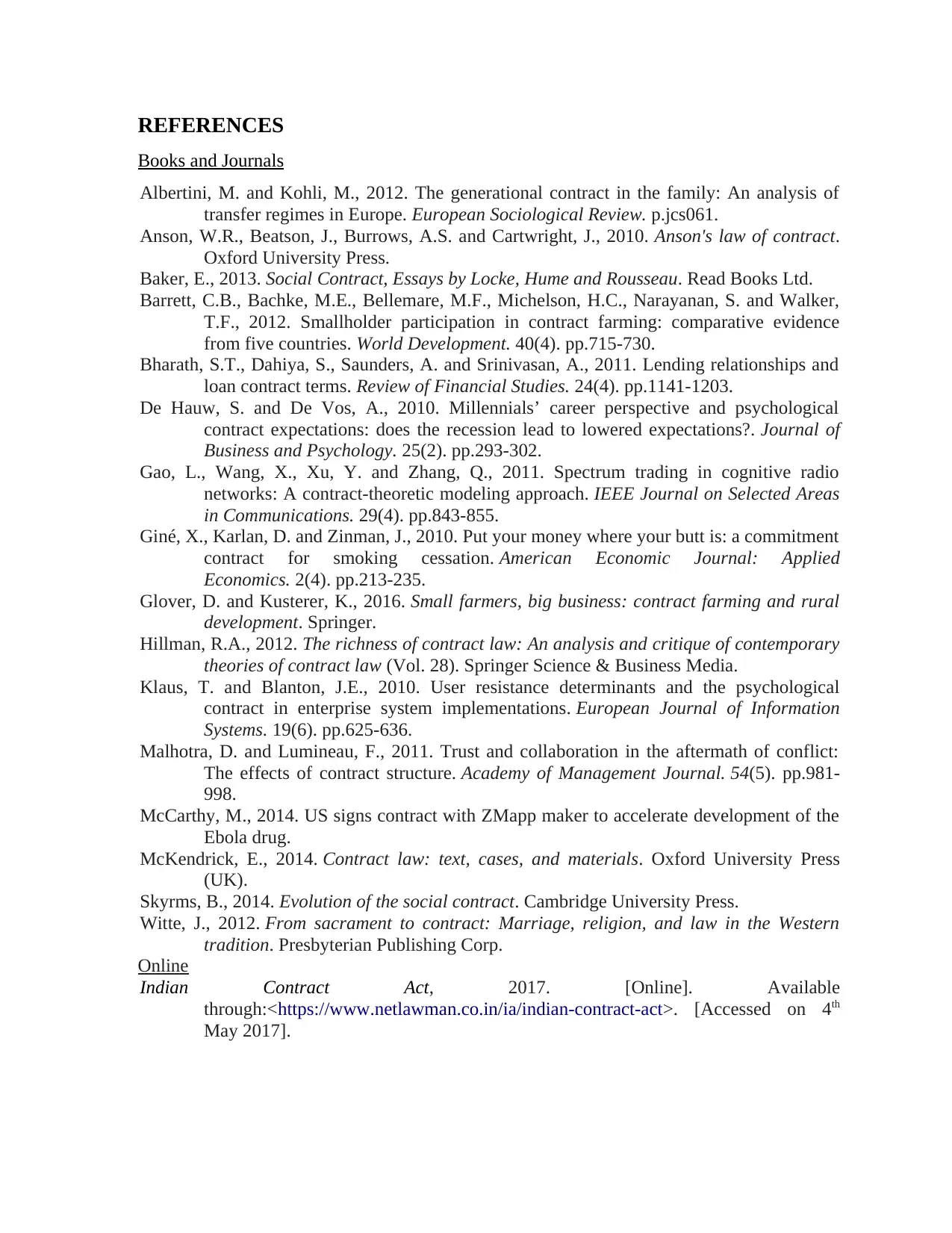
REFERENCES
Books and Journals
Albertini, M. and Kohli, M., 2012. The generational contract in the family: An analysis of
transfer regimes in Europe. European Sociological Review. p.jcs061.
Anson, W.R., Beatson, J., Burrows, A.S. and Cartwright, J., 2010. Anson's law of contract.
Oxford University Press.
Baker, E., 2013. Social Contract, Essays by Locke, Hume and Rousseau. Read Books Ltd.
Barrett, C.B., Bachke, M.E., Bellemare, M.F., Michelson, H.C., Narayanan, S. and Walker,
T.F., 2012. Smallholder participation in contract farming: comparative evidence
from five countries. World Development. 40(4). pp.715-730.
Bharath, S.T., Dahiya, S., Saunders, A. and Srinivasan, A., 2011. Lending relationships and
loan contract terms. Review of Financial Studies. 24(4). pp.1141-1203.
De Hauw, S. and De Vos, A., 2010. Millennials’ career perspective and psychological
contract expectations: does the recession lead to lowered expectations?. Journal of
Business and Psychology. 25(2). pp.293-302.
Gao, L., Wang, X., Xu, Y. and Zhang, Q., 2011. Spectrum trading in cognitive radio
networks: A contract-theoretic modeling approach. IEEE Journal on Selected Areas
in Communications. 29(4). pp.843-855.
Giné, X., Karlan, D. and Zinman, J., 2010. Put your money where your butt is: a commitment
contract for smoking cessation. American Economic Journal: Applied
Economics. 2(4). pp.213-235.
Glover, D. and Kusterer, K., 2016. Small farmers, big business: contract farming and rural
development. Springer.
Hillman, R.A., 2012. The richness of contract law: An analysis and critique of contemporary
theories of contract law (Vol. 28). Springer Science & Business Media.
Klaus, T. and Blanton, J.E., 2010. User resistance determinants and the psychological
contract in enterprise system implementations. European Journal of Information
Systems. 19(6). pp.625-636.
Malhotra, D. and Lumineau, F., 2011. Trust and collaboration in the aftermath of conflict:
The effects of contract structure. Academy of Management Journal. 54(5). pp.981-
998.
McCarthy, M., 2014. US signs contract with ZMapp maker to accelerate development of the
Ebola drug.
McKendrick, E., 2014. Contract law: text, cases, and materials. Oxford University Press
(UK).
Skyrms, B., 2014. Evolution of the social contract. Cambridge University Press.
Witte, J., 2012. From sacrament to contract: Marriage, religion, and law in the Western
tradition. Presbyterian Publishing Corp.
Online
Indian Contract Act, 2017. [Online]. Available
through:<https://www.netlawman.co.in/ia/indian-contract-act>. [Accessed on 4th
May 2017].
Books and Journals
Albertini, M. and Kohli, M., 2012. The generational contract in the family: An analysis of
transfer regimes in Europe. European Sociological Review. p.jcs061.
Anson, W.R., Beatson, J., Burrows, A.S. and Cartwright, J., 2010. Anson's law of contract.
Oxford University Press.
Baker, E., 2013. Social Contract, Essays by Locke, Hume and Rousseau. Read Books Ltd.
Barrett, C.B., Bachke, M.E., Bellemare, M.F., Michelson, H.C., Narayanan, S. and Walker,
T.F., 2012. Smallholder participation in contract farming: comparative evidence
from five countries. World Development. 40(4). pp.715-730.
Bharath, S.T., Dahiya, S., Saunders, A. and Srinivasan, A., 2011. Lending relationships and
loan contract terms. Review of Financial Studies. 24(4). pp.1141-1203.
De Hauw, S. and De Vos, A., 2010. Millennials’ career perspective and psychological
contract expectations: does the recession lead to lowered expectations?. Journal of
Business and Psychology. 25(2). pp.293-302.
Gao, L., Wang, X., Xu, Y. and Zhang, Q., 2011. Spectrum trading in cognitive radio
networks: A contract-theoretic modeling approach. IEEE Journal on Selected Areas
in Communications. 29(4). pp.843-855.
Giné, X., Karlan, D. and Zinman, J., 2010. Put your money where your butt is: a commitment
contract for smoking cessation. American Economic Journal: Applied
Economics. 2(4). pp.213-235.
Glover, D. and Kusterer, K., 2016. Small farmers, big business: contract farming and rural
development. Springer.
Hillman, R.A., 2012. The richness of contract law: An analysis and critique of contemporary
theories of contract law (Vol. 28). Springer Science & Business Media.
Klaus, T. and Blanton, J.E., 2010. User resistance determinants and the psychological
contract in enterprise system implementations. European Journal of Information
Systems. 19(6). pp.625-636.
Malhotra, D. and Lumineau, F., 2011. Trust and collaboration in the aftermath of conflict:
The effects of contract structure. Academy of Management Journal. 54(5). pp.981-
998.
McCarthy, M., 2014. US signs contract with ZMapp maker to accelerate development of the
Ebola drug.
McKendrick, E., 2014. Contract law: text, cases, and materials. Oxford University Press
(UK).
Skyrms, B., 2014. Evolution of the social contract. Cambridge University Press.
Witte, J., 2012. From sacrament to contract: Marriage, religion, and law in the Western
tradition. Presbyterian Publishing Corp.
Online
Indian Contract Act, 2017. [Online]. Available
through:<https://www.netlawman.co.in/ia/indian-contract-act>. [Accessed on 4th
May 2017].

⊘ This is a preview!⊘
Do you want full access?
Subscribe today to unlock all pages.

Trusted by 1+ million students worldwide
1 out of 9
Related Documents
Your All-in-One AI-Powered Toolkit for Academic Success.
+13062052269
info@desklib.com
Available 24*7 on WhatsApp / Email
![[object Object]](/_next/static/media/star-bottom.7253800d.svg)
Unlock your academic potential
Copyright © 2020–2026 A2Z Services. All Rights Reserved. Developed and managed by ZUCOL.




